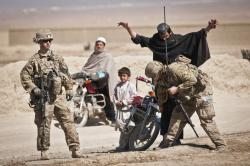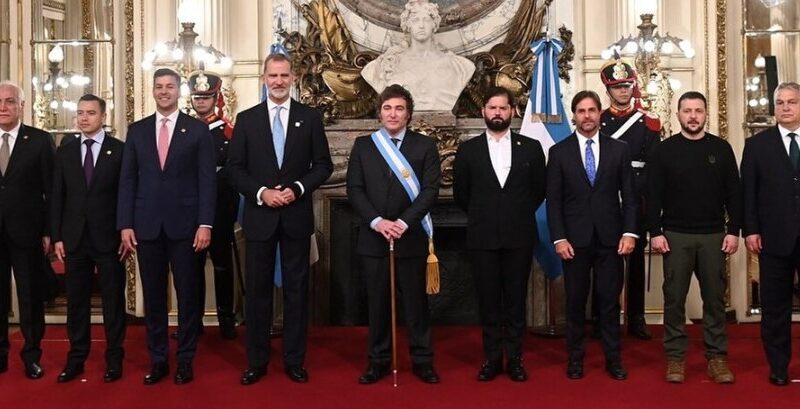By Hassan, Asian Marxist Review.
The recent spike in terrorist activities of militant groups in Afghanistan’s capital and elsewhere in the country underscores the fragility and complexity of the situation on the ground. The US-Taliban “peace” deal seems to be in disarray after the Afghan president Ashraf Ghani initially ordered his armed forces to be in “aggressive” mode against the Taliban insurgents.
But so weak and frail is Ghani’s government, that in contrast to his earlier belligerence, on May 26th he pledged to release 900 Taliban prisoners. On the other hand, US imperialism, after concluding the instrument of surrender with Taliban, dubbed as a “peace deal, spending over $1trillion on the Afghan war and having more than 2400 of its soldiers dead over the last two decades, is now rushing to withdraw its forces as per the terms of the deal with Taliban.
Attack on maternity hospital in Kabul
The Afghan government is struggling to keep itself alive as an uncertain future is looming over its head, more so for the unfortunate populace of the country.
The terrorist attacks in Afghanistan are relentlessly raging even after the peace deal was been signed in Qatar on February 29th. Some of these attacks were attributed to IS-KP (the Afghan ISIS). Taliban outrightly denied they carried out some of these attacks and even condemned the attack on the maternity hospital in Kabul.
It is quite hilarious that one of the annexes of the deal is that Taliban would, henceforth, not attack the US and coalition forces, whereas it is not bound by any clause of the agreement not to attack Afghan forces. Consequently, when President Ashraf Ghani blamed Taliban for the maternity hospital attacks, Taliban carried out a suicide attack on an Afghan military convoy killing five civilians and injuring dozens, in retaliation for being blamed. Such is the present precarious and miserable position of the Afghan government.
‘Peace deal’ is an instrument of defeat
Paradoxically, the Taliban was created and armed by Pakistan with the tacit support of US imperialism. After the collapse of the Soviet Union, all eyes were on the untapped oil and gas reserves of the Caspian Sea and Central Asian states. The United States wanted to control these resources but to unlock these treasures, a pipeline had to be built from Turkmenistan through Afghanistan and then to Pakistan, ending up in the Arabian Sea.
The interim President of Afghanistan, Burhanuddin Rabbani, had already granted the pipeline contract to the Argentine Bridas Corporation, much to the dismay of America. When the Taliban ousted Rabbani and took over Kabul in September 1996, the then US Assistant Secretary of State, Robin Raphel, termed it as a “positive step”. She even met several Taliban leaders including Mullah Muhammad Umer, and supported a gas pipeline project led by UNOCAL, a US company. But after the bombing of US embassies in Tanzania and Kenya, UNOCAL withdrew from pipeline negotiations with the Taliban.
In the aftermath of the 9/11 attacks, US imperialism and its stooge United Kingdom, invaded Afghanistan to overthrow the Taliban, punish Al-Qaeda, fight ‘terrorism’ and build ‘democracy’.
Initially, they succeeded in ousting the Taliban and installed a puppet regime in its place. The euphoria of the initial conquest soon started to dissipate and a renewed Taliban insurgency began to haunt them. With the support of the Pakistani state, the Taliban swiftly reorganized and struck back through guerrilla attacks, suicide bombings on coalition forces’ convoys, targeting government and NATO installations and civilian targets, so much so that Taliban started controlling a large swathe of the country.
US military superiority is meaningless
The mightiest military power on earth, with all its technological advancement, sophisticated weaponry and aerial supremacy, proved utterly impotent in containing a resurgent Taliban. The covert support of regional states, especially of Pakistan, for the Taliban made US military superiority meaningless.
Afghanistan has always been considered by the Pakistani ruling classes as its strategic depth. The Taliban, as a strategic asset of Pakistan, was to turn Afghanistan into a strategic depth for Pakistan.
After the Taliban’s ouster from power, Pakistan continued its support for the group and the Taliban had the additional leverage of safe havens in Pakistan. Besides, it has had an uninterrupted supply of new recruits from religious seminaries across Pakistan and the proceeds from the drug trade are its financial lifeline. Taliban forces are more familiar with the tough terrain of the country. They easily mingle with the local population due to cultural affinity, making it difficult for the NATO forces to differentiate between the locals and the Taliban insurgents.
Desperate measures brought no respite
The spiralling Taliban insurgency compelled US imperialists to deploy more troops to quell it, but more US troops simply brought more easy targets for the Taliban. In 2010, the US forces deployed in Afghanistan reached a peak of more than 100,000. Even these desperate measures could not bring any respite for the Americans. During this mayhem, the Taliban further increased its territorial gains.
Consequently, US imperialism, as a token of defeat, started to pull out its combat forces from Afghanistan in 2011, which it completed in 2014. The remaining troops, numbering 8,400, were for training and assistance to the Afghan security forces.
Lingering defeat and crisis
With the advent of the Trump administration in 2016, the USA deployed a few thousands more troops, but it changed nothing for the Americans. The defeat of US imperialism at the hands of some of the most reactionary mercenaries on earth was a foregone conclusion. The lingering defeat and the crisis of US imperialism compelled them to pack up and escape.
The recent agreement with the Taliban is more about granting US forces a safe passage than any kind of peace deal. Stephen Biddle, a Columbia University professor of International and public affairs and a former adviser to US commanders in Kabul, told the Associated Press, “A lot of this boils down to: was the US–Taliban agreement any of kind of serious negotiation at all, or was it just totally a fig leaf to cover abject withdrawal? I suspect the latter”. Thus, the so-called “war on terror” launched by the US President George W. Bush back in 2001, came to an ignominious end.
Afghan Government Left at the Mercy of Taliban
How much the US cares about the jargon of democracy or “democratic government” is evident from the fact that during the whole farce of “peace talks” with the Taliban, the Afghan government was completely excluded. Neither the United States nor Taliban cared to talk to them. The government in Kabul was supposed to just act upon the agreement, whatever was concluded between the US and Taliban.
How could it be otherwise? The Kabul government lives on the crumbs of international donations. Its army is being propped up by $4 billion of annual US aid. The Ghani government tried hard to dislodge the talks, and subsequently the deal itself, to prevent US withdrawal, obviously for its own survival. Ashraf Ghani even blamed the Taliban for the terrorist attack on the maternity hospital in Kabul, but the Taliban denied responsibility and condemned the attacks. The United States blamed ISIS for the attacks. Ghani announced renewed military operations against the Taliban to nudge them towards abandonment of the deal.
US and Taliban seem committed to the deal
Neither would the US want to further prolong its ignominious stay in Afghanistan due to the organic socioeconomic decadence of American capitalism, nor would the Taliban want to disrupt the reaping of the harvest, much to the dismay of Ashraf Ghani.
Despite Ghani’s provocations, both the US and the Taliban seem committed to the deal. The main plank of the deal concerning Afghan government is the release of thousands of Taliban prisoners. After the deal was signed, the Kabul government initially refused to release them.
So fragile is the so-called puppet “democratic” government in Kabul that they can’t survive without the donations and support from the imperialist countries. In the presidential elections of 2014, both Ashraf Ghani and Abdullah Abdullah claimed victory. The then US Secretary of State, John Kerry, came to Kabul and threatened both the contenders with the freezing of foreign donations to Afghan government unless they form a unity government. They knelt. This time around the same squabbling was repeated with both Ghani and Abdullah claiming victory and both swearing in as president.
But this time the US Secretary of State, Mike Pompeo, not only reprimanded both leaders after failed negotiations with them, but actually announced a reduction of $1billion in annual military aid to Afghanistan. Both again knelt before their master and agreed to form a unity government. Ghani was also compelled to announce the release of Taliban prisoners.
Post-US Scenario
Back in 2001, when the US invaded Afghanistan, they envisioned a Taliban overthrow, establishing a strong foothold in the country, turning it into a launching pad for further adventures in the region and everything would go smoothly. But after pouring more than a trillion US dollars on military campaigns and billions of dollars on “reconstruction”, neither ‘terrorism’ nor the Taliban could be defeated or Afghanistan reconstructed.
Today, the Taliban controls more territory in Afghanistan than at any time since 2001. The historical crisis of American imperialism is so intense and their frustration so deep that they are even planning to complete their withdrawal ahead of the agreed date. Trump is contemplating a complete withdrawal before the November presidential election.
Despite all the technological, military and economic superiority of US imperialism, they were subdued by an army of reactionary fanatics with basic weaponry. This fact proves, albeit negatively, that US imperialism is not invincible.
Financial and economic dependency
Given the above facts, it is not difficult to envisage a bleak future for the Kabul government. If the Taliban can bring the US to their knees, despite all their superiority, it is easy to imagine what they can do to the weak Afghan government. The Taliban would regard their triumph incomplete without ousting Ghani and Abdullah. In the most likely scenario, they would be replaced by their own men. In any case, it would be a government not different from its predecessors, given its financial and economic dependency on international donors. The Taliban has no different socio-economic program than the incumbent Ghani-led government.
Given the nature of The Taliban’s reactionary origin, its reliance on drug-trafficking and its factions being the proxies of neighbouring countries, this would be a constant source of conflict in the future. Already ISIS has launched several deadly attacks since the signing of the deal. ISIS in Afghanistan is the leftover of the crimes of US imperialism. The ISIS fighters were brought from Iraq and Syria to contain the Taliban. Also, some local factions, falling out of favour with the Taliban leadership, are operating under this umbrella.
In past years, Taliban commanders emphasized that if the United States didn’t support ISIS, they would soon crush them. Now that the United States is hastening a withdrawal, ISIS has stepped up its deadly bombings. The rogue Taliban factions will also flex their muscles and create further destabilization. A combination of these factors would mean the mayhem of continuous conflicts.
Is Misery Afghanistan’s Destiny?
Afghanistan has been in the throes of conflicts, violence, and civil war for the last forty years. The Saur Revolution of 27th April, 1978 under the leadership of leftist Peoples’ Democratic Party of Afghanistan had envisioned a prosperous, advanced and egalitarian society. But the subsequent imperialist-sponsored reactionary jihad against that revolution and the later invasion of the Soviet Union derailed the revolutionary process.
The fall of Najibullah’s government in 1992, which ended in the victory of counter-revolution, ushered in years of civil war amongst the different factions of Mujahideens. The later rise of the Taliban, with the help of Pakistan and the support of US imperialism, led to the capture of Kabul and most parts of Afghanistan by the Taliban. It signified an epoch of dark reaction.
The US invasion and the post-Taliban period has been the continuation of the same misery and deprivation, albeit in the garb of a puppet ‘democracy’. This democracy is composed of the same Jihadi butchers who drowned the Afghan Revolution in blood. It has brought nothing substantial for the masses. The civil war has been raging ever since and has taken a heavy toll on the lives of the people. After the US withdrawal, the new government setup will also fail to address the most basic problems of employment, poverty, education, health etc. The misery will continue.
Revolutionary changes in neighbouring countries
Afghanistan is one of the most backward countries in Asia, with no industrial base, a weak infrastructure and a narco-economy and with neighbouring states, especially Pakistan, having a deep penetration and imprint. Given all this, it implies that any elementary change in the country is subject to revolutionary changes in neighbouring countries, above all in Pakistan.
Pakistan is already in the midst of one of the deepest crises of its history. The coronavirus pandemic has further deepened the crisis. The society is on the verge of a social explosion. In the same way, Iran is already in the throes of social movements which have been temporarily interrupted by the pandemic. Sooner rather than later, these movements will resurrect with a vengeance. A victorious socialist revolution in Pakistan will cut the umbilical cord of reaction and fanaticism in Afghanistan and reaction will collapse like a house of cards. It will embolden the revolutionaries in Afghanistan who will be assisted by their revolutionary brethren in Pakistan. This revolutionary wave would immediately pave the way for a revolutionary transformation in Afghanistan.
June 3, 2020
From the Asian Marxist Review. The original, and other articles on the subcontinent, go here.



